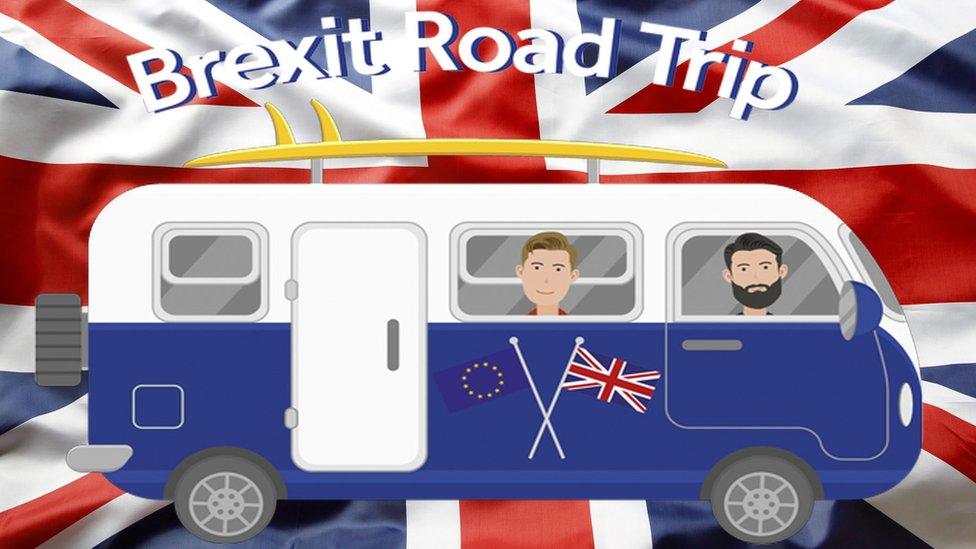Brexit: Politicians answer your questions
- Published

With just six months to go, you might have thought the ins and outs of Brexit would have been clear by now.
But, if anything, it just seems to be getting more complicated - with infighting, posturing and endless jargon.
With that in mind, we've spent the week touring the country in the Newsbeat Campervan, getting your questions.
And we've put them to a Conservative MP, Suella Braverman, and an independent MEP, Marian Harkin.
Scissors, single-markets and subsidies: Brexit in the hairdressers
Will there be another vote?
Ollie asked us this - he's an 18-year-old apprentice hairdresser.
"The referendum in 2016 was a once in a generation thing," thinks Suella Braverman - who's a Brexit minister.
"It had a record turn out from people all over the country and it's really important that we honour that result.
"So no there isn't going to be a second referendum - we're going to deliver on this result and make the most of it."
Allow X content?
This article contains content provided by X. We ask for your permission before anything is loaded, as they may be using cookies and other technologies. You may want to read X’s cookie policy, external and privacy policy, external before accepting. To view this content choose ‘accept and continue’.
But Marian Harkin is less sure.
"I think it's 50:50. But things are changing so fast. I think a lot depends on the outcome of the deal and whether Parliament votes it through or not.
"I don't have a crystal ball but my instinct is that it's less likely that we'll have a second referendum. But then, as I said, the ground is shifting."
Why haven't we left yet?
This one came from Sion Owens - who works at Holyhead sailing club in Wales.
"Be patient Sion, this takes time," says Marian Harkin, "everything from flight safety to food safety is connected to the EU.
"Take the Mini car, for example, in order to be manufactured that has to cross twice between the EU and the UK.
"We're trying to negotiate some kind of reasonable deal, in order to find a way that the UK can leave and the economy won't be damaged and ordinary people can get on with their lives."
Solving Brexit on the football pitch
What about the Irish border?
Fergal works for a hen and stag do company in Sligo in the Republic of Ireland. They get a lot of customers from over the border in Northern Ireland.
But when the UK leaves, that border will separate a country that is in the European Union from one that isn't.
And this has been a big sticking point for the negotiations so far - how can you have two countries next to each other with different rules on things like trade and immigration, without putting in checkpoints?
Allow X content?
This article contains content provided by X. We ask for your permission before anything is loaded, as they may be using cookies and other technologies. You may want to read X’s cookie policy, external and privacy policy, external before accepting. To view this content choose ‘accept and continue’.
Fergal is worried about how his business might be affected.
"I would be very hopeful, Fergal, that what we call the Common Travel Area - which is where people can cross the border - will remain intact," says Marian Harkin.
"It pre-dates the EU and we expect it to remain after Brexit.
"I have significant concerns around the border overall - but as far as travel goes I am very hopeful that things will remain as always. So for your business, at least, that shouldn't be an issue."
Jamie and Shannon have been together for three years and live on different sides of the Irish border
Suella Braverman agrees that, when it comes to travel, things should be okay.
"We've committed as a government to make sure we don't have any hard border between Northern Ireland and the Republic of Ireland.
"This is an important issue and it's one that we're going to get right."
Follow Newsbeat on Instagram, external, Facebook, external and Twitter, external.
Listen to Newsbeat live at 12:45 and 17:45 every weekday on BBC Radio 1 and 1Xtra - if you miss us you can listen back here.